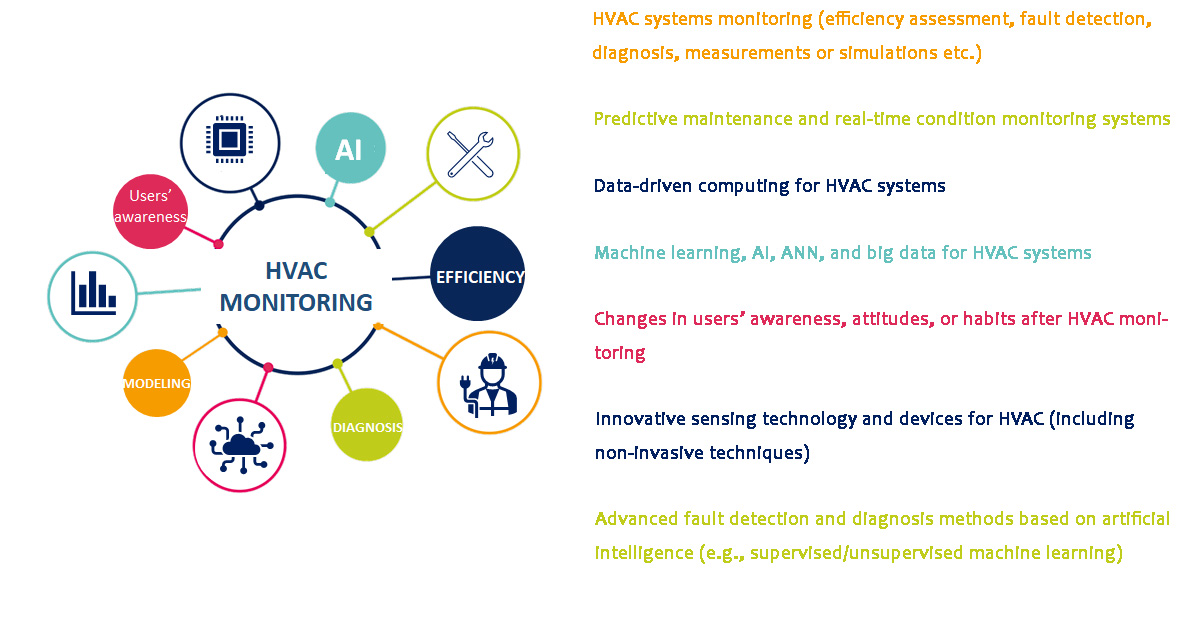- 2.8Impact Factor
- 5.5CiteScore
- 15 daysTime to First Decision
Data-Driven Method for HVAC and Heat Pump System: From Monitoring to Fault Detection and Diagnosis
This special issue belongs to the section “Process Control and Monitoring“.
Special Issue Information
Dear Colleagues,
To tackle climate change and achieve the ambitious targets set by energy policies, a great amount of effort is needed to reduce energy consumption and greenhouse gas emissions.
It is widely acknowledged that technical systems for heating, cooling and air-conditioning, and ventilation (HVAC) play an important role: on one hand, their efficiency strongly affects the final buildings’ consumption; on the other hand, they are primarily involved in the thermal comfort of users and occupants, who might overlook the energy and environmental effects of settings and control strategies.
In this framework, it is important to accurately assess the efficiency of HVAC systems, as well as their aging, fault income, or diagnosis, for the implications above and also for the economic drawbacks of maintenance.
Currently, the spread of affordable monitoring systems, sensing technologies, and advanced fault-detecting devices allows us to gather hundreds of empirical data for the purpose of fault detection and diagnosis, further aided by data-driven methods such as clustering methods, artificial intelligence (AI), big data, and the Internet of Things (IoT).
The goal of this issue is to bring researchers and stakeholders together to share their findings and present perspectives in the field of HVAC system monitoring, fault detection, and diagnosis based on data-driven methods.
Research papers, short communications, reviews, guidelines, project outcomes and lessons learnt are welcome on (but are not limited to) the following topics:
- HVAC systems monitoring (efficiency assessment, fault detection, diagnosis, etc.);
- Predictive maintenance and real-time condition monitoring systems;
- Data-driven computing for HVAC systems;
- Machine learning, AI, ANN, and big data for HVAC systems;
- Measurements or simulations for assessing and enhancing HVAC system efficiency;
- Changes in users’ awareness, attitudes, or habits after HVAC monitoring;
- Computational methods of modelling faults;
- Innovative sensing technology and devices for HVAC (including non-invasive techniques);
- Advanced fault detection and diagnosis methods based on artificial intelligence (e.g., supervised/unsupervised machine learning).
Dr. Iole Nardi
Dr. Domenico Palladino
Guest Editors
Manuscript Submission Information
Manuscripts should be submitted online at www.mdpi.com by registering and logging in to this website. Once you are registered, click here to go to the submission form. Manuscripts can be submitted until the deadline. All submissions that pass pre-check are peer-reviewed. Accepted papers will be published continuously in the journal (as soon as accepted) and will be listed together on the special issue website. Research articles, review articles as well as short communications are invited. For planned papers, a title and short abstract (about 250 words) can be sent to the Editorial Office for assessment.
Submitted manuscripts should not have been published previously, nor be under consideration for publication elsewhere (except conference proceedings papers). All manuscripts are thoroughly refereed through a single-blind peer-review process. A guide for authors and other relevant information for submission of manuscripts is available on the Instructions for Authors page. Processes is an international peer-reviewed open access semimonthly journal published by MDPI.
Please visit the Instructions for Authors page before submitting a manuscript. The Article Processing Charge (APC) for publication in this open access journal is 2400 CHF (Swiss Francs). Submitted papers should be well formatted and use good English. Authors may use MDPI's English editing service prior to publication or during author revisions.
Keywords
- HVAC monitoring
- HVAC diagnosis
- HVAC fault detection
- HVAC aging effects
- data-driven computing
- ANN
- AI
- machine learning
- random forest
- sensing technologies and devices
- NDT for HVAC
- users’ awareness from real data
- predictive maintenance

Benefits of Publishing in a Special Issue
- Ease of navigation: Grouping papers by topic helps scholars navigate broad scope journals more efficiently.
- Greater discoverability: Special Issues support the reach and impact of scientific research. Articles in Special Issues are more discoverable and cited more frequently.
- Expansion of research network: Special Issues facilitate connections among authors, fostering scientific collaborations.
- External promotion: Articles in Special Issues are often promoted through the journal's social media, increasing their visibility.
- Reprint: MDPI Books provides the opportunity to republish successful Special Issues in book format, both online and in print.


